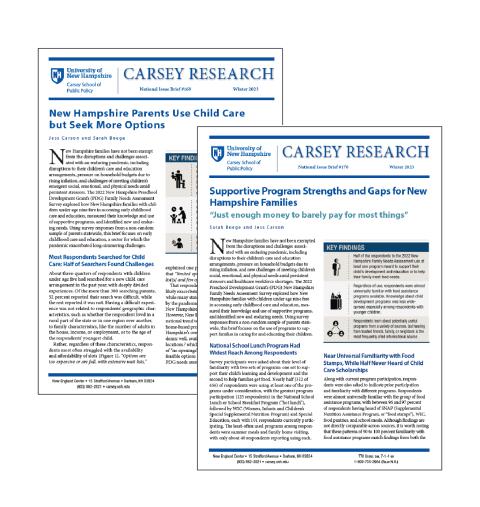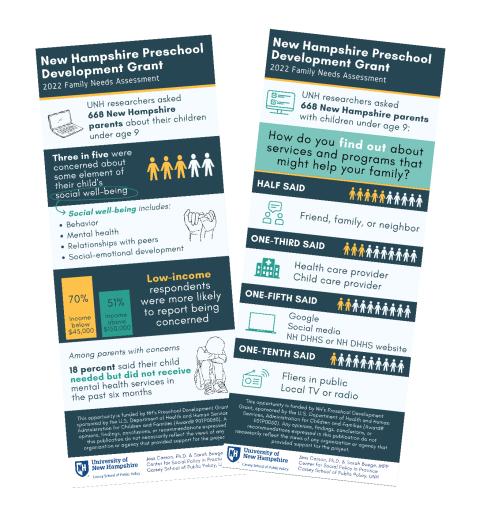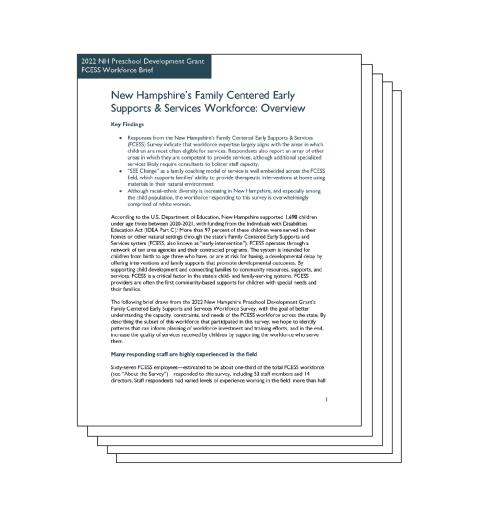Between 2020 and 2023, the New Hampshire Preschool Development Grant (PDG) was a federally funded $26.8 million collaboration between the University of New Hampshire's College of Health and Human Services, the New Hampshire Department of Health and Human Services, and the New Hampshire Department of Education. When the NH PDG concluded in 2023, the partners received an additional $3.9 million in PDG planning grant funding. More information about the NH PDG, including prior years' needs assessments
What is the goal of the PDG?
The PDG aims to build New Hampshire’s early childhood serving systems to improve coordination across systems, better address the needs of disadvantaged children, and create a foundation of improved early childhood outcomes across the state.
What is the Carsey School’s role in the PDG?
In 2022, the Carsey School of Public Policy served as the needs assessment contractor for the annual PDG needs assessment activities. Drawing on their academic expertise in early childhood and survey methodology, deep understanding of New Hampshire, and strong local networks, researchers at Carsey’s Center for Social Policy in Practice spearheaded the third and final needs assessment of the three-year project. In 2024, the Center reconnected with the PDG team to carry out the needs assessment activities related to the planning grant.
What was the result of the needs assessment activities?
The 2022 activities included a survey of New Hampshire parents with children under age nine, a survey of the state's Family Centered Early Supports and Services (early intervention) workforce, and a survey of staff at children's programs across the state's community mental health centers. The results from each are below.

RESEARCH BRIEFS
Dive into the needs assessment findings through two research briefs from the family needs assessment survey, including one on child care (New Hampshire Parents Use Child Care but Seek More Options) and one on program use (Supportive Program Strengths and Gaps for New Hampshire Families).

INFOGRAPHICS
For a bite-sized look at the findings, check out our infographics. The first one outlines parents' concerns about their children under age 9, and the second one describes how they found out about services and programs that might help their families.

PAPERS
Find results from the Family Centered Supports and Services workforce survey in two papers, workforce overview and a paper on staffing challenge. For more from the community mental health center staff, see our overview paper, our paper on staff vacancies facing the workforce, and our paper summarizing reported training needs.
The 2024 needs assessment centered on the launch of the Granite Guide to Early Childhood and assessing the availability of preschool in New Hampshire's public schools.
Where can I find more details about the 2022 survey methodology?
Details about each survey’s methodology are included in the corresponding papers. Copies of the survey instruments are available here via the UNH PDG website. If you still have a question, please reach out to Jess.
Who contributed to this research?
The 2022 briefs and infographics were created by the Center for Social Policy in Practice (SPiP) in partnership with the NH PDG team, including Ellyn Schreiber, LCMHC, ECFMHC, who served as the NH PDG's Department of Health and Human Services Integration Coordinator. Survey recruitment and data collection for the 2022 surveys were supported by the New Hampshire Parent Information Center / New Hampshire Family Voices, and the UNH Survey Center. The 2024 materials were created by SPiP in partnership with Rebecca Glauber, M.S., who served as the PDG's project manager. Research support was provided by Amy Barry and Kamala Nasirova. Editorial and layout expertise was provided by Laurel Lloyd, Benjamin Savard, and Bailey Schott.
The following disclaimer applies to all work included on this page: This opportunity is funded by NH’s Preschool Development Grant, sponsored by the U.S. Department of Health and Human Services, Administration for Children and Families (Awards# 90TP0060 & 90TP0110). Any opinions, findings, conclusions, or recommendations expressed in this publication do not necessarily reflect the views of any organization or agency that provided support for the project.

